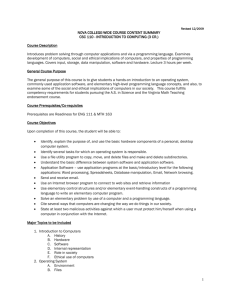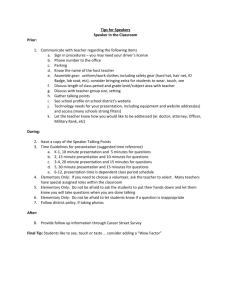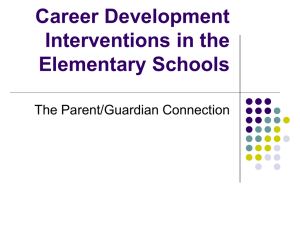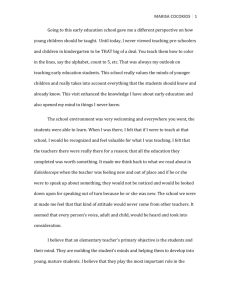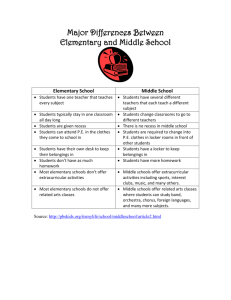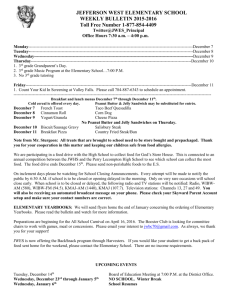Goal 2 Develop social awareness and interpersonal skills to interact
advertisement
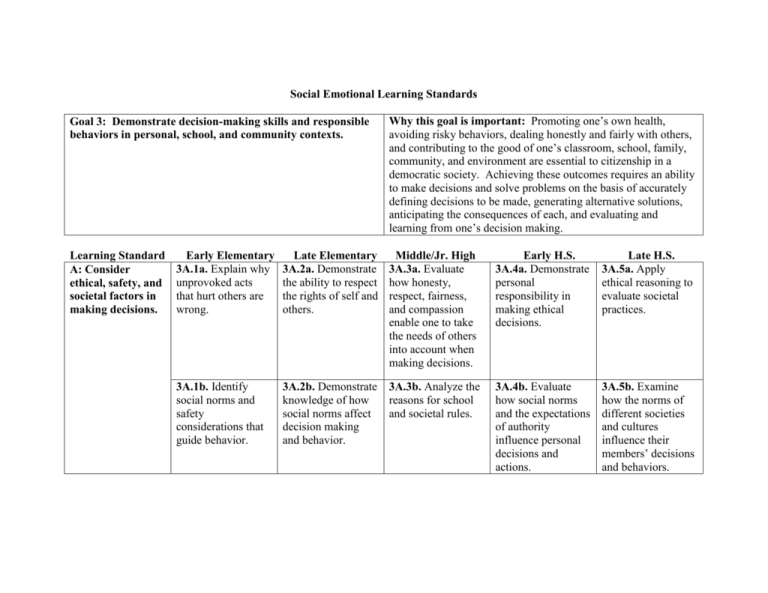
Social Emotional Learning Standards Goal 3: Demonstrate decision-making skills and responsible behaviors in personal, school, and community contexts. Why this goal is important: Promoting one’s own health, avoiding risky behaviors, dealing honestly and fairly with others, and contributing to the good of one’s classroom, school, family, community, and environment are essential to citizenship in a democratic society. Achieving these outcomes requires an ability to make decisions and solve problems on the basis of accurately defining decisions to be made, generating alternative solutions, anticipating the consequences of each, and evaluating and learning from one’s decision making. Learning Standard A: Consider ethical, safety, and societal factors in making decisions. Early Elementary 3A.1a. Explain why unprovoked acts that hurt others are wrong. Late Elementary 3A.2a. Demonstrate the ability to respect the rights of self and others. Middle/Jr. High 3A.3a. Evaluate how honesty, respect, fairness, and compassion enable one to take the needs of others into account when making decisions. Early H.S. 3A.4a. Demonstrate personal responsibility in making ethical decisions. Late H.S. 3A.5a. Apply ethical reasoning to evaluate societal practices. 3A.1b. Identify social norms and safety considerations that guide behavior. 3A.2b. Demonstrate knowledge of how social norms affect decision making and behavior. 3A.3b. Analyze the reasons for school and societal rules. 3A.4b. Evaluate how social norms and the expectations of authority influence personal decisions and actions. 3A.5b. Examine how the norms of different societies and cultures influence their members’ decisions and behaviors. Learning Standard B: Apply decisionmaking skills to deal responsibly with daily academic and social situations. Early Elementary 3B.1a. Identify a range of decisions that students make at school. Late Elementary 3B.2a. Identify and apply the steps of systematic decision making. Middle Jr. High 3B.3a. Analyze how decision-making skills improve study habits and academic performance. 3B.1b. Make positive choices when interacting with classmates. 3B.2b. Generate alternative solutions and evaluate their consequences for a range of academic and social situations. 3B.3b. Evaluate strategies for resisting pressures to engage in unsafe or unethical activities. Early H.S 3B.4a. Evaluate personal abilities to gather information, generate alternatives, and anticipate the consequences of decisions. 3B.4b. Apply decision-making skills to establish responsible social and work relationships. Late H.S. 3B.5a. Analyze how present decision making affects college and career choices. 3B.5b. Evaluate how responsible decision making affects interpersonal and group relationships. Learning Standard C. Contribute to the well-being of one’s school and community. Early Elementary 3C.1a. Identify and perform roles that contribute to one’s classroom. Late Elementary 3C.2a. Identify and perform roles that contribute to the school community. 3C.1b. Identify and perform roles that contribute to one’s family. 3C.2b.Identify and perform roles that contribute to one’s local community. Middle/Jr. High 3C.3a. Evaluate one’s participation in efforts to address an identified school need. Early H.S. 3C.4a. Plan, implement, and evaluate one’s participation in activities and organizations that improve school climate. 3C.3b. Evaluate 3C.4b. Plan, one’s participation implement, and in efforts to address evaluate one’s an identified need in participation in a one’s local group effort to community. contribute to one’s local community. Late H.S. 3C.5a. Work cooperatively with others to plan, implement, and evaluate a project to meet an identified school need. 3C.5b. Work cooperatively with others to plan, implement, and evaluate a project that addresses an identified need in the broader community.
